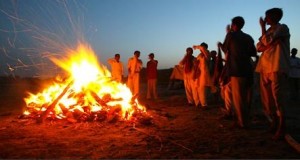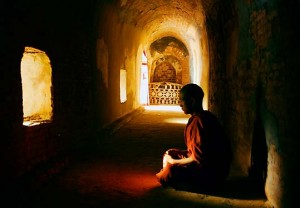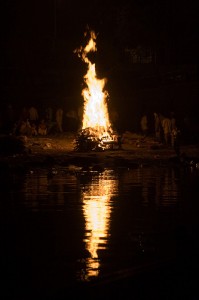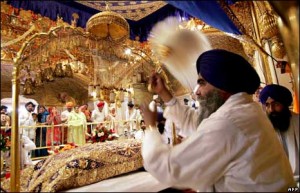India, home to over a billion people, is also home to a plethora of cultural and religious traditions. The birthplace of Hinduism, Buddhism, Jainism, and Sikhism, India also hosts a large number of followers of other major religions, including large Muslim and Christian populations.
This diversity of cultural and religious beliefs also creates a variety of traditions surrounding life and death in the country. Different cultures have different beliefs regarding the purpose of human life, as well as varying rituals surrounding the end of life and death. In honor of our week devoted to India, we’ll examine some of the rituals of these native religions in order to gain a greater understanding of the culture.
Hinduism
 In the Bhagavad Gita, the sacred text of Hinduism, the god Krishna explains that death is the passing of the solid into another body. Hindus traditionally cremate their dead in order to facilitate this process of reincarnation.
In the Bhagavad Gita, the sacred text of Hinduism, the god Krishna explains that death is the passing of the solid into another body. Hindus traditionally cremate their dead in order to facilitate this process of reincarnation.
After the death of a family member, loved ones are involved in the funeral planning, procession, and burial or cremation of the body. Cremation is the preferred method for most Hindus, although some exceptions are made. The bodies of deceased infants, for example, will traditionally be buried rather than cremated.
When possible, the cremation ceremony is performed on the banks of the Ganges or other sacred rivers, and the ashes are then scattered there.
The closest relative, typically the oldest son, preforms the last rite at the cremation site, lighting the funeral pyre and guarantee the release from this world.
Buddhism
 Mahayana Buddhism, the most common Buddhist tradition in India today, is centered around a belief in the cycle of suffering and rebirth, driven by karma. The avoidance of unwholesome actions and the focus on positive actions drives the life of the Buddhist, because these actions will plant karmic seeds that will come to fruition later in life or in a subsequent existence.
Mahayana Buddhism, the most common Buddhist tradition in India today, is centered around a belief in the cycle of suffering and rebirth, driven by karma. The avoidance of unwholesome actions and the focus on positive actions drives the life of the Buddhist, because these actions will plant karmic seeds that will come to fruition later in life or in a subsequent existence.
Buddhism rejects the idea of an eternal soul or any permanent incarnation of self. Accoding to the beliefs of Buddhism, rebirth is the continuation of a process whereby the self is integrated with the rest of the universe, a process driven by cause and effect (karma). Rebirth is not the same as reincarnation – as in Hinduism – whereby the independent, eternal soul passes from one existence to the next. Rebirth, instead, is the continuation of the existence of the dependent soul.
Early Buddhists, including the Buddha, followed the Indian tradition of cremation after death, and modern Buddhists, including those in the West, have followed suit. Before death, monks will come to the Buddhist home to chant verses to comfort the dying person. These monks will stay with the body after death and continue chants as the body is being prepared for cremation.
Buddhist cremations follow the Indian tradition of the funeral pyre, and this practice has even made its way west with the religion.
Jainism
 Though the total population of followers of Jainism in the world is small by comparison to the world’s major religions, the majority of these followers – up to 4.2 million – in India. The religion is centered around a path of non-violence toward all living beings. Distinct to the Jain belief is the refusal to kill animals, insects, or plants for food.
Though the total population of followers of Jainism in the world is small by comparison to the world’s major religions, the majority of these followers – up to 4.2 million – in India. The religion is centered around a path of non-violence toward all living beings. Distinct to the Jain belief is the refusal to kill animals, insects, or plants for food.
Core to Jainism is the belief that all living things have a soul, that every soul is potentially divine, and we should therefore treat every living being as we do ourselves, harming none and being kind to everyone.
Jains also believe in karma and rebirth, though with some variances from the Buddhist and Hindu traditions. According to Jain belief, karma is divided into the “destructive”, which affects the soul, and the “non-destructive”, which affects the body, with different kinds of karma within each of these categories. The path of the soul is to lead to liberation from the cycle of rebirth and death.
Karma in Jainism, like in Buddhism, is driven by actions in physical life. Depending on one’s karma, death can be rebirth into a physical body on earth, liberation into the highest level of heaven, or enduring suffering in one of the eight hells. Unlike the image of hell in many other major religions, the eight hells become progressively colder as they down in level, and suffering in hell is not eternal. Once a soul has endured punishment, it can be reborn to another realm.
At the Jain deathbed and surrounding the body after death, a mantra is recited and hymns are sung. The body is cremated within twenty-four hours of death. Before cremation, the Jain funeral rites consist of a period of meditation for the peace of the soul, and a sermon and advice to those present. After cremation, the ashes are traditionally scattered in the Ganges or another sacred river.
Sikhism
 Sikhism emphasizes a belief in the equality of all humans, and a rejection of discrimination based on caste, creed, and gender. In this monotheistic religion, God is a shapeless, timeless, and sightless entity. Sikh traditions and beliefs are driven by the teachings of ten gurus – from the Sanskrit for guide, teacher, or mentor – the first being Guru Nanak. Each guru added to and reinforced the lessons of the previous to create the resulting Sikh religion.
Sikhism emphasizes a belief in the equality of all humans, and a rejection of discrimination based on caste, creed, and gender. In this monotheistic religion, God is a shapeless, timeless, and sightless entity. Sikh traditions and beliefs are driven by the teachings of ten gurus – from the Sanskrit for guide, teacher, or mentor – the first being Guru Nanak. Each guru added to and reinforced the lessons of the previous to create the resulting Sikh religion.
At the end of life, an individual is encouraged to recite passages of scripture and focus on God and the divine. After death, the funeral arrangements are made by the family, and include a funeral ceremony followed by a complete reading of the Guru Granth Sahib. The body is traditionally cremated, though other means of disposition may be employed if cremation is not possible. The Sikh funeral ceremony is called “Antam Sanskar”, and is a celebration of the completion of life, rather than a moment to mourn the passing of the individual. Sikhism emphasizes a resignation to the will of the creator, and sees death as a natural process and an opportunity to reunite the soul with its maker.
This brief overview, of course, only touches on the broad spectrum of cultural and spiritual beliefs of this vast country. Continue to follow SevenPonds this week, as we further explore the traditions of India and the impact of the life of Mohandas Gandhi, not only on this country, but on the world in which we all live.
Other Sources:http://www.ourindia.org/facts-about-india/death-rituals-of-india.html
http://www.iloveindia.com/indian-traditions/funeral-traditions.html
http://atheism.about.com/od/hindusandhinduism/a/IndiaRituals.htm
http://en.wikipedia.org/wiki/Buddhism#Life_and_the_world
http://www.buddhanet.net/d_cermon.htm
http://www.religionfacts.com/jainism/beliefs.htm
http://en.wikipedia.org/wiki/Jainism#Core_beliefs
http://www.religionfacts.com/jainism/beliefs.htm
http://www.deathreference.com/Ho-Ka/Jainism.html

 The End-of-Life and Death in India
The End-of-Life and Death in India




 Composting Bodies Is Now Legal in a Dozen States
Composting Bodies Is Now Legal in a Dozen States














